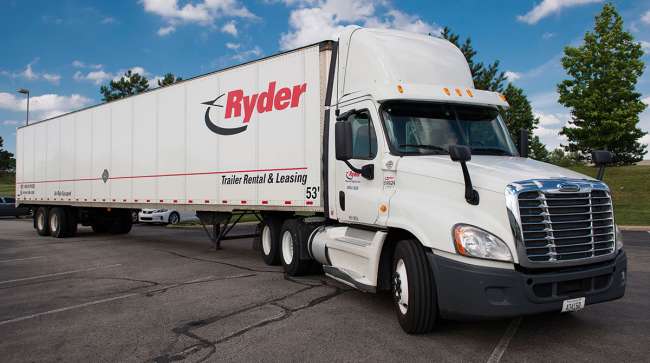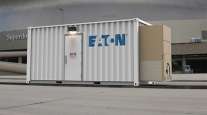Staff Reporter
Lower Used Truck Prices, Weak Rental Market Hurt Ryder Profits

[Stay on top of transportation news: Get TTNews in your inbox.]
Profits at Ryder System Inc. fell in the first quarter of 2024 on sharply lower used tractor and truck prices and weak rental market conditions, the company said April 23, but saw a boost from recent acquisitions.
Ryder Supply Chain Solutions ranks No. 11 on the Transport Topics Top 100 list of the largest for-hire carriers in North America and No. 8 on the TT Top 100 list of the largest logistics companies.
The company posted net income of $85 million in the most recent three-month period, down 38.8% from $139 million in the year-ago quarter.
Miami-based Ryder reported generally accepted accounting principles (GAAP) earnings per share from continuing operations of $1.89 compared with $2.95 a year earlier.
That said, Ryder reported total revenue of $3.098 billion in Q1, up 5% compared with $2.952 billion in the prior-year period, and is growing more optimistic about the prospects for the coming year.
The company posted operating revenue of $2.495 billion in Q1, up 6% compared with $3.346 billion, which it said reflected acquisitions and contractual revenue growth. That strength, however, partially was offset by lower commercial rental revenue at its Fleet Management Solutions unit.
FMS, which is Ryder’s biggest unit, reported total revenue of $1.455 billion in the three months that ended March 31, down 3% compared with $1.503 billion in the year-ago period. The segment includes Ryder’s used vehicle sales and SelectCare maintenance operations.
Used tractor sales prices in the most recent quarter fell 34% year-over-year, while used truck prices fell 30% compared with Q1 2023, according to Ryder.
The FMS unit also took a hit from lower fuel costs being passed through to customers and lower operating revenue, which reflected the commercial rental market. The company said this largely was offset by higher revenue at its ChoiceLease leasing and maintenance program.
Ryder System, Inc. has just inked its first Ryder ChoiceLease contracts under the innovative RyderElectric+ turnkey fleet solution. https://t.co/VUHHhw4aXt — The EV Report (@The_EV_Report) December 5, 2023
ChoiceLease’s fleet totaled 147,100 vehicles at the end of the most recent quarter, up 8% compared with 136,600 vehicles 12 months earlier, with 134,400 vehicles typically active, up 4% compared with 128,700 in the 2023 period.
Ryder’s commercial rental fleet shrank 13% year-over-year in Q1 to 35,700 from 41,200, and the utilization rate was 66% compared with 75% in Q1 2023.
Ryder’s Supply Chain Solutions segment posted an 8% increase in total revenue to $1.302 billion from $1.201 billion a year earlier.
The rise reflected increased operating revenue and higher subcontracted transportation costs passed through to customers, the company said, with the former due largely to recent acquisitions.
Volvo's Chayene de Souza and Magnus Gustafson discuss how new, connected trucks can boost business, enhance safety practices, and reinforce preventative maintenance plans. Tune in above or by going to RoadSigns.ttnews.com.
However, the company’s Dedicated Transportation Solutions unit notched the biggest rise in earnings, 24% to $563 million from $454 million in the same period a year earlier.
“Ryder delivered solid first-quarter results amid a challenging freight environment by continuing to execute on our balanced growth strategy,” CEO Robert Sanchez said. “The outperformance in the quarter was driven by better-than-expected used vehicle results and benefits from our ongoing maintenance cost savings initiative.”
The company sold 6,500 used vehicles in the most recent quarter, up 27% compared with 5,100 in the year-ago period.
“We remain focused on profitable growth of our contractual lease, supply chain and dedicated businesses as part of our balanced growth strategy,” Sanchez said. “Higher ChoiceLease results and our maintenance cost saving initiative benefited FMS results.”
“Strong automotive performance as well as earnings from recent acquisitions benefited SCS. In DTS, integration of the Cardinal acquisition is on track, and we expect to achieve planned synergies,” he said.
Excited to welcome the Cardinal Logistics team to Ryder! Together, we gain greater economies of scale, provide even more flexibility for transportation networks, and offer a broader range of products, services, and technology. Together we’re Ever better!https://t.co/jLcur4gpzt — Ryder (@RyderSystemInc) February 1, 2024
Ryder completed the acquisition of Concord, N.C.-based Cardinal Logistics on Feb. 1 for an undisclosed sum.
Cardinal Logistics ranks No. 51 on the for-hire TT100 and was No. 63 on the logistics TT100 prior to the deal.
The acquisition of Cardinal plus co-packing and co-manufacturing specialist Impact Fulfillment Systems, a deal that closed in October, is boosting the company’s overall prospects.
As we look ahead, we are focused on the successful integration of our recent acquisitions.
Chief Financial Officer John Diez
“As we look ahead, we are focused on the successful integration of our recent acquisitions and executing on our asset management playbook through this challenging freight environment,” Chief Financial Officer John Diez said.
“We are raising the lower end of our full-year forecast to reflect the outperformance in the quarter, partially offset by a more modest rental upturn than initially expected,” he said. “We are also raising our free cash flow forecast and reducing our rental capital spending forecast by $100 million to align with this revised outlook.”
Ryder’s full-year EPS range guidance stands at $10.95-$11.70 compared with $10.70-$11.70 previously. However, the company now expects total revenue growth of around 10% in 2024, down from a 13% increase provided alongside its fourth-quarter 2023 earnings.
Want more news? Listen to today's daily briefing below or go here for more info:





